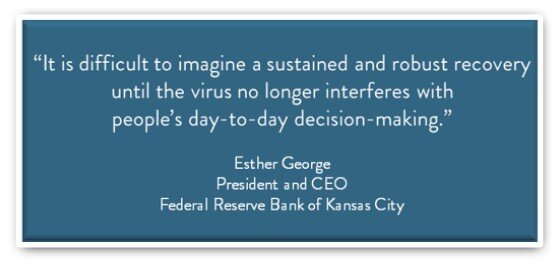The key to resilience after a tumultuous year according to the President and CEO of the Federal Reserve Bank of Kansas City
Ms. Esther George, president and chief executive of the Federal Reserve Bank of Kansas City, spoke with more than 125 members of Central Exchange today, sharing her annual look back on last year and look ahead to the future.
“Last year was one for the record books.” Ms. George said as she described five oddities of 2020 caused by the pandemic’s impact on people and the economy:
The GDP had its largest decline on record and its largest increase too.
Unemployment hit a 50-year low before rising to levels not seen since the Great Depression more than ninety years ago.
The equity market reached record highs.
The price of oil dropped to less than zero for a short time.
Government debt rose more rapidly than ever before, even as the yield on government securities set record lows.
For its part, Ms. George added, the Federal Reserve, “broke new ground in policy accommodation, while also expanding its balance sheet to record size.”
While Ms. George’s role is tied to using the Fed’s tools to support a strong economy, her remarks were tied to the human impact of the pandemic too. She showed keen understanding of the pandemic’s impact on households and referred several times to the disruption it caused.
She spoke about job loss and how it stifles future career advancement opportunities especially for those most impacted by the pandemic; student loan debt and its impact on those who earned the degree/certification and those who hold the debt without it; and how helping small businesses is crucial to the economic recovery.
Ms. George spoke several times about technology driving the economy and changes to Fed practices. One example is the increased reliance on e-commerce and online payments. The Fed’s current system is too slow to support the immediate payment transaction, so it is working on a new system to enable more innovation regarding online financial transfers. The new system is a few years away, but it was refreshing to hear it is in the works.
For her economic outlook, Ms. George pointed out the economic growth stalled at the end of 2020 as consumer spending was down. Consumer uncertainty about the economy impacts spending, which gets attention. Consumer spending is down, however, savings are two times higher than they were before the pandemic.
I am not an economist, so I liked hearing people are saving more in order to protect themselves from the turbulence of the pandemic and other uncertainties.
Ms. George is optimistic about the eventual recovery, but her optimism is tempered by how well the vaccine distribution will continue to be handled. She said, “It is difficult to imagine a sustained and robust recovery until the virus no longer interferes with people’s day-to-day decision-making.”
In addition to the vaccine, Ms. George listed three other positive indications for the economic recovery:
Investors are optimistic that demand will return to hardly hit sectors (e.g. leisure, hospitality, travel).
Companies with inventory ran their inventories low, so as recovery evolves, they will need to re-stock, thus, impacting supply chains.
Aggregate personal income was at a high after the CARES Act payments, which will spur spending as the pandemic wanes. Since people are saving more now, they will have more to spend when they do not fear the pandemic’s effects on their jobs and lives.
Ms. George’s address of 2020 also emphasized how important consumer spending was to economic growth. At the time, I encouraged consumers to keep saving and let corporations spend more. That was pre-pandemic, yet, my encouragement stands. (Link to the 2020 summary.)
Big banks and many big corporations have healthy balance sheets boosted by taking government loans during the pandemic because the interest is so low. Their CEOs are coming out of the pandemic with healthy personal balance sheets too. They have the money, so let’s encourage them to spend it and bare more of the burden for the economic recovery.
The bottom line for Ms. George was that the economic recovery depends significantly on the eradication of the COVID-19 virus.
Her intention with regard to the Federal Reserve’s post-pandemic policy is to “wait and see” when the virus loosens its grip on the economy. She seemed hopeful for a quick rebound, unlike the prolonged agony after the 2008 recession.
Ms. George’s optimism, accompanied by her wisdom, delivered a ray of hope during this tumultuous time.


